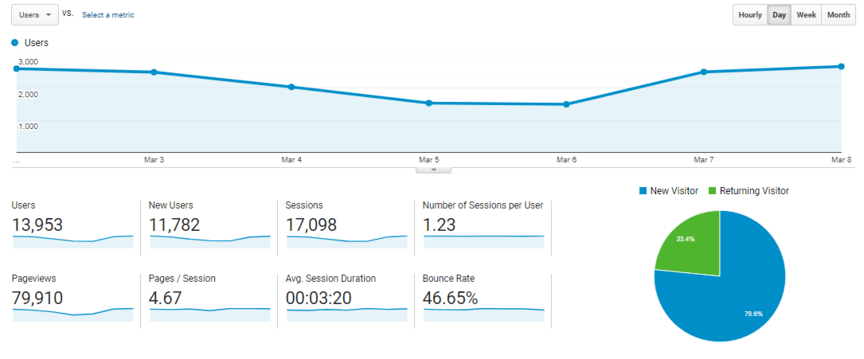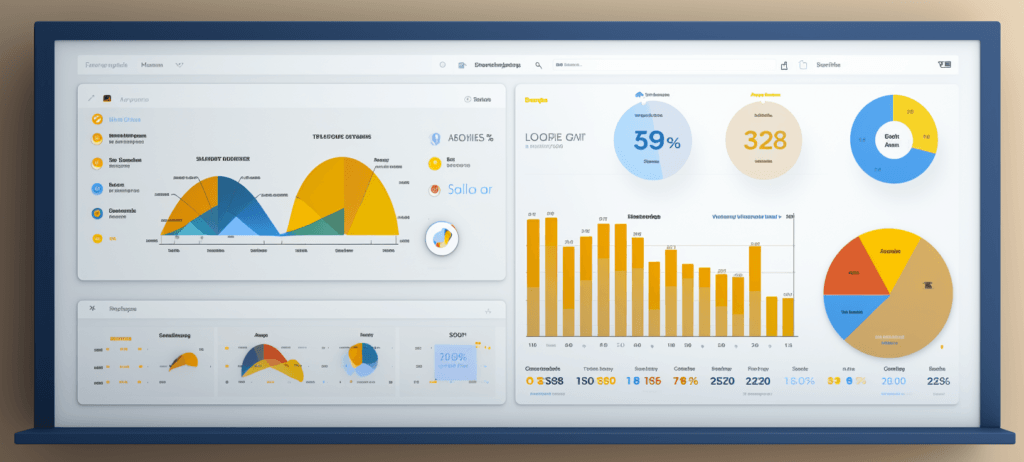-
 Published: Apr 1, 2025
Published: Apr 1, 2025
-
 11 min. read
11 min. read
-
 Lornah Ngugi
Lornah Ngugi Marketing Writer
Marketing Writer
- Lornah is a marketing writer with over six years of experience and a knack for writing unique and compelling content for a wide variety of topics in diverse industries. She has written over 400 posts for WebFX clients spanning tech, manufacturing, professional services, and other industries. She likes to start her days with a quiet outdoor walk in the park followed by a perfectly brewed cup of black coffee. There’s nothing a chocolate bar can’t fix for Lornah, from a bad mood to writer’s block.
Key Takeaway
Only 54% of digital marketers are confident in how they measure and report their digital marketing ROI.
Digital marketing reporting is the key to tracking valuable metrics and data that inform your marketing strategies so you can earn the highest possible return on investment (ROI) for your company.
Effective and efficient digital marketing reports help companies make informed decisions about their marketing strategies and campaigns. When done right, digital marketing reporting helps businesses align campaigns and efforts with a company’s strategic goals and find opportunities for growth and improvement.
According to Nielsen Annual Marketing Report, only 54% of digital marketers are confident in how they measure and report their digital marketing ROI. To help you increase your knowledge and confidence in digital marketing reports, we bring you this comprehensive guide on everything there is to know about creating them.
Here is a brief overview of some of the topics we’ll cover on this page:
- What is digital marketing reporting?
- Why does digital marketing reporting matter?
- Common elements to include in your digital marketing report
- Tools for digital marketing reporting
- Best practices when creating your digital marketing report
- Common mistakes in digital marketing reporting
What is digital marketing reporting?
Digital marketing reporting is the process of collecting, analyzing, and compiling data about your digital marketing strategies in a structured form. Depending on your current strategies and goals, your report can consist of various metrics and data points to help you track the success of your campaigns.
Businesses need digital marketing reports to justify their marketing budgets, measure progress, evaluate campaign performance, and power data-driven decisions. Well-compiled reports act as a storytelling and data visualization tool that details campaign performance.
Why does digital marketing reporting matter?
Digital marketing reports have numerous advantages for businesses looking forward to driving traffic, conversions, leads, or revenue. Here are the top benefits of digital marketing reports for businesses:
- Promote open communication: Digital marketing reports show clients what you’ve been able to achieve and what you intend to do to close the gap. This matters because, according to 36% of digital marketing agencies, transparency and communication are the leading drivers of client retention.
- Verify the impact of digital marketing: Marketing reports provide real-time data on key metrics like conversion rates, bounce rates, click-through rates, and ROI for every digital marketing channel and strategy.
- Identify optimization opportunities: Analyzing the data on digital marketing reports helps marketers and clients to see what’s working, what’s not, and what can be done better.
- Facilitate data-driven decision-making: Successful marketing campaigns use data and analytics to fast-track business decisions. Recent research indicates that 76% of organizations leverage marketing analytics for decision-making and 56% to shape strategy.
Common elements to include in your digital marketing report
While each type of report will require individual, unique sections, there are a few common elements that most reports will have. Here are those common topics:
1. Strategic overview
Every digital marketing report should begin with a strategic overview. It’s a summary of key action items that makes it easier for clients to find the most essential points in the report.
A strategic overview sets the stage by summarizing the objectives, goals, and context of the marketing initiatives being measured. What should be included in the overview? A strategic overview typically includes:
- A brief description of the campaign and activities that are being reported
- The marketing objectives may include brand awareness, lead generation, and sales growth.
- The key performance indicators (KPIs) that are tied to these objectives.
2. Campaign performance
The campaign performance section dives into the details of specific campaigns. They offer a comprehensive view of how they performed across different channels.
They can be segmented by platform, including Google Ads, Facebook, Instagram, and LinkedIn, to provide a granular understanding of success. Or digital marketing strategies such as social media marketing, search engine optimization, and pay-per-click advertising.
Key campaign performance data points to include in your marketing reports:
- Click-through rates (CTR) to find out how engaging the ads or content were
- Impressions and reach to discover how many people saw the campaign
- Cost per click (CPC) or the cost per acquisition (CPA) to find how efficient the spending was
3. Website engagement data
Website engagement is a vital component of any digital marketing report as it demonstrates how visitors interact with your website. Marketers use website analytics tools, such as Google Analytics, Hotjar, or Mixpanel, to measure web engagement KPIs, like user behavior and site performance, and create reports.
Part of the website engagement data is to highlight opportunities for website optimization. Improving load times and enhancing user experience on key pages will show you what works.
4. Social media performance
Measuring social media marketing success involves using either in-built analytic tools or third-party tools to help you understand the effectiveness of social media strategies and engagement efforts. There are tens of social media metrics you can measure, but be keen on the following impactful ones:
- Conversion rates
- Post reach
- Potential reach
- Audience growth rate
- Applause rate
- Average engagement rate
Some metrics that are not helpful or meaningful enough to be included in digital marketing reports include page views, impressions, page likes, and number of followers.
5. Market research
The foundation of your report will be in this section. The marketing research will also include performance data. The combination of both will result in insights into:
- How competitors are performing in similar campaigns and industries
- Emerging opportunities or shifts that may affect marketing strategies
- Updates on target demographics, behaviors, and preferences
Effective digital marketing reports must include some key features, such as:
- List recommendations for next steps: A great way to end any strategy is to include steps for moving forward toward goals. Include key takeaway summarizations from the data and actionable recommendations to improve future performance.
- Include visuals: We recommend, including charts, graphs, and industry benchmarks in your reports to simplify complex marketing data and make it easier to compare data between different periods or strategies.
- Utilize a funnel representation: A funnel analysis can give your report a visualization of how users move through the marketing funnel, identify drop-off points, and highlight potential areas for improvement.
Tools for digital marketing reporting
While it’s possible to collect, analyze, and report digital marketing data manually, it’s time-consuming and wastes resources. Professional marketers utilize innovative data collection and reporting tools to save time and ensure the accuracy of the reports.
Some effective digital marketing analysis and reporting tools include:
- RevenueCloudFX: A cutting-edge WebFX smart reporting tool with 20+ features to track, measure, and report data to drive revenue through marketing. It provides 1 billion plus data points and can deliver at least 20% average ROI increase.
- Google Analytics: A free analytics tool for tracking and reporting website and social media data that can be integrated with Google Workspace tools, like Google Search Console. It’s great for evaluating large data sets and custom metrics.
- Whatagraph: An AI-powered marketing reporting tool for automating marketing report creation and standardizing multi-source marketing data. It relieves marketers of the manual labor involved in organizing, visualizing, connecting, and sharing data.
- Google Looker Studio: Another user-friendly AI reporting tool that automates data analysis and creates comprehendible reports and dashboards. It’s easy to use, customizable, and allows real-time collaboration and feedback.
Best practices when creating your digital marketing report
Marketing reports are an excellent way for businesses to track progress as they work toward achieving their marketing and strategic business goals. It is a comprehensive document that provides stakeholders with insights, recommendations, and actionable value.
Here are a few top tips that ensure digital marketing reports are helpful:
- Consider your focus marketing strategies
- Choose a reporting frequency
- Select which metrics you want to measure
- Compile your report and analyze your results
Consider your focus marketing strategies
Deciding the marketing strategies to focus on for each campaign helps you narrow down which campaigns you’ll be tracking in your report.
Here are just a few examples of digital marketing strategies you can implement for your company:
- Search engine optimization (SEO): It’s the best strategy if you’re looking to drive higher organic traffic to your website and more qualified leads and leads.
- Pay-per-click (PPC) advertising: PPC is the right strategy if you are looking to drive immediate results, quick visibility, and trackable metrics.
- Email marketing: It’s an affordable and targeted marketing strategy with a high ROI of between $36 and $40 for every dollar spent.
- Content marketing: It’s an effective and cost-effective strategy that’s great for boosting brand loyalty, enhancing awareness, and strengthening your reputation.
- Social media marketing: The ideal strategy to boost brand awareness, loyalty, and customer engagement with more advanced targeted advertising.
Select which metrics you want to measure
Perhaps the most important element of your marketing report is selecting which data and metrics you want to measure. When considering which metrics to track, be sure to think about your business goals.
For example, if you want to increase your web traffic, you’ll want to analyze your traffic sources to see which strategies are driving the most users to your website.

Here are a few examples of key digital marketing metrics to always highlight in your digital marketing reports:
You can also track essential audience behavior data on your website, such as how much time users spend on your web pages and their demographics, such as age and location.
Avoid wasting your time with vanity metrics, which are headline-grabbing metrics that don’t represent website or business health. Some popular examples of vanity metrics include social media followers, website visitors, and keyword rankings.
Choose a reporting frequency
Businesses need frequent reports, and they may expect weekly, bi-weekly, monthly, or quarterly reports. Frequent reports give business decision-makers confidence the confidence that they’re getting what they paid for while also keeping you accountable.
Digital marketing partners must clarify which durations are most effective and helpful, depending on the scope and entire duration of the project. Monthly reports are recommended because they are comprehensive and allow for trend identification and timely adjustments.
Weekly reports ensure communication and collaboration with stakeholders, especially in the early stages of digital marketing campaigns. Quarterly and annual reports are great for long-time ongoing campaigns and comparing different reporting periods.
Compile your report and analyze your results
Once you’ve implemented your marketing strategies, picked your reporting frequency, and chosen the metrics you want to measure, it’s time to compile your digital marketing report.
Be sure to include critical metrics for each of your strategies so you can easily measure the performance of your campaigns and your progress toward your business goals. And once you’ve compiled your report, it’s essential to analyze your marketing results.

Take note of which campaigns drive the most web traffic, leads, and conversions for your business. You can also analyze your audience’s behavioral data to better understand which strategies your target audience responds to the most.
As a result, you can identify areas of your strategies that need improvements, so you can optimize your campaigns to drive more sales and revenue for your business.
Download Now: Free Digital Marketing Report Template
Common mistakes in digital marketing reporting
Marketing reporting fails to deliver desired results when marketers make the following mistakes when collecting data, analyzing metrics, and reporting. Below we highlight the most common marketing reporting fails:
- Considering vanity metrics: These waste resources on metrics that don’t directly translate to driving revenue or other tangible results.
- Using unreliable data sources: These lead to inaccuracies in your reports with long-term negative impacts.
- Lacking visualizations: Without visuals, digital marketing reports are complex, boring, and difficult to interpret.
- Failing to compare different periods: Comparing marketing report periods helps businesses make data-driven decisions for future campaigns.
Track and manage your digital marketing strategies with transparent reports from WebFX
If you want to track and manage your digital marketing strategies with ease, WebFX can help! WebFX is an industry-leading digital marketing agency specializing in tracking and analyzing essential metrics to create data-driven strategies that boost revenue.
When you partner with WebFX, we’ll take care of implementing and managing your digital marketing strategies so you can focus on your other business tasks. We’ll also keep you informed every step of the way with our frequent, transparent reports.
In just the past few years, we’ve helped businesses just like yours drive over $10 billion in revenue with our data-driven marketing campaigns and award-winning software, RevenueCloudFX.
Speak with one of our strategists today by calling 888-601-5359 or contact us online to learn more about how our digital marketing services can drive sales and revenue for your business.
-
 Lornah is a marketing writer with over six years of experience and a knack for writing unique and compelling content for a wide variety of topics in diverse industries. She has written over 400 posts for WebFX clients spanning tech, manufacturing, professional services, and other industries. She likes to start her days with a quiet outdoor walk in the park followed by a perfectly brewed cup of black coffee. There’s nothing a chocolate bar can’t fix for Lornah, from a bad mood to writer’s block.
Lornah is a marketing writer with over six years of experience and a knack for writing unique and compelling content for a wide variety of topics in diverse industries. She has written over 400 posts for WebFX clients spanning tech, manufacturing, professional services, and other industries. She likes to start her days with a quiet outdoor walk in the park followed by a perfectly brewed cup of black coffee. There’s nothing a chocolate bar can’t fix for Lornah, from a bad mood to writer’s block. -

WebFX is a full-service marketing agency with 1,100+ client reviews and a 4.9-star rating on Clutch! Find out how our expert team and revenue-accelerating tech can drive results for you! Learn more
Try our free Marketing Calculator
Craft a tailored online marketing strategy! Utilize our free Internet marketing calculator for a custom plan based on your location, reach, timeframe, and budget.
Plan Your Marketing Budget
Table of Contents
- What is Digital Marketing Reporting?
- Why Does Digital Marketing Reporting Matter?
- Common Elements to Include in Your Digital Marketing Report
- Tools for Digital Marketing Reporting
- Best Practices when Creating Your Digital Marketing Report
- Common Mistakes in Digital Marketing Reporting
- Track and Manage Your Digital Marketing Strategies with Transparent Reports from WebFX

Proven Marketing Strategies

Proven Marketing Strategies
Try our free Marketing Calculator
Craft a tailored online marketing strategy! Utilize our free Internet marketing calculator for a custom plan based on your location, reach, timeframe, and budget.
Plan Your Marketing Budget






